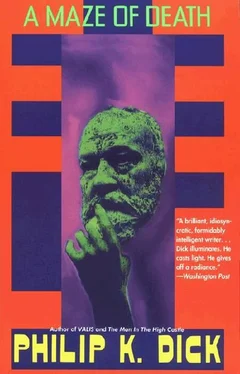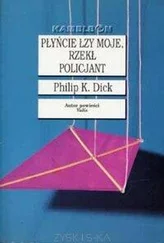Thugg was holding a sponge which he had fished from a small, warm pool. “This is artificial. But there are legitimate sponges like this on Delmak-O. And these are fakes, too.” From the water Thugg grabbed a wriggling snake-like creature with short, stubby legs that thrashed furiously. Swiftly, Thugg removed the head; the head came off and the creature stopped moving. “A totally mechanical contraption—you can see the wiring.” He restored the head; once more the creature began flopping. Thugg tossed it back in the water and it swam happily off.
“Where’s the Building?” Mary Morley said.
Maggie Walsh said, “It—seems to change locations. The last time anyone encountered it it was along this ridge and past the geysers. But it probably won’t be next time.”
“We can use this as a starting stage,” Betty Jo Berm said. “When we get to the spot where it last was we can fan out in various directions.” She added, “It’s a shame we don’t have intercoms with us. They would be a lot of help.”
“That’s Belsnor’s fault,” Thugg said. “He’s our elected leader; he’s supposed to think of technical details like that.” To Seth Morley, Betty Jo Berm said, “Do you like it out here?”
“I don’t know yet.” Perhaps because of Susie Smart’s death he felt repelled by everything he saw. He did not like the mixture of artificial life forms with the real ones: the mixing together of them made him sense the whole landscape as false… as if, he thought, those hills in the background, and that great plateau to the right, are a painted backdrop. As if all this, and ourselves, and the settlement—all are contained in a geodetic dome. And above us Treaton’s research men, like entirely deformed scientists of pulp fiction, are peering down at us as we walk, tiny-creature-wise, along our humble way.
“Let’s stop and rest,” Maggie Walsh said, her face grim and elongated still; the shock of Susie’s death had, for her, not worn off in the slightest. “I’m tired. I didn’t have any breakfast, and we didn’t bring any food with us. This whole trip should have been carefully planned out in advance.”
“None of us were thinking clearly,” Betty Jo Berm said with sympathy. She brought a bottle out of her skirt pocket, opened it, sorted among the pills and at last found one that was satisfactory.
“Can you swallow those without water?” Russell asked her. “Yes,” she said, and smiled. “A pillhead can swallow a pill under any circumstances.”
Seth Morley said to Russell, “For B.J. it’s pills.” He eyed Russell, wondering about him. Like the others, did this new member also have a weak link in his character? And if so, what was it?
“I think I know what Mr. Russell’s fondness is for,” Wade Frazer said in his somewhat nasty, baiting voice. “He has, I believe, from what I’ve observed about him, a cleaning fetish.”
“Really?” Mary Morley said.
“I’m afraid so,” Russell said and smiled to show perfect, white teeth, like the teeth of an actor.
They continued on and came, at last, to a river. It seemed too wide to cross; there they halted.
“We’ll have to follow the river,” Thugg said. He scowled. “I’ve been in this area, but I didn’t see any river before.”
Frazer giggled and said, “It’s for you, Morley. Because you’re a marine biologist.”
Maggie Walsh said, “That’s a strange remark. Do you mean the landscape alters according to our expectation?”
“I was making a joke,” Frazer said insultingly.
“But what a strange idea,” Maggie Walsh said. “You know, Specktowsky speaks about us being ‘prisoners of our own preconceptions and expectations.’ And that one of the conditions of the Curse is to remain mired in the quasi-reality of those proclivities. Without ever seeing reality as it actually is.,’
“Nobody sees reality as it actually is,” Frazer said. “As Kant proved. Space and time are modes of perception, for example. Did you know that?” He poked at Seth Morley. “Did you know that, mister marine biologist?”
“Yes,” he answered, although in point of fact he had never even heard of Kant, much less read him.
“Specktowsky says that ultimately we can see reality as it is,” Maggie Walsh said. “When the Intercessor releases us from our world and condition. When the Curse is lifted from us, through him.”
Russell spoke up. “And sometimes, even during our physical lifetime, we get momentary glimpses of it.”
“Only if the Intercessor lifts the veil for us,” Maggie Walsh said.
“True,” Russell admitted.
“Where are you from?” Seth Morley asked Russell.
“From Alpha Centauri 8.”
“That’s a long way from here,” Wade Frazer said.
“I know.” Russell nodded. “That’s why I arrived here so late. I’d been traveling for almost three months.”
“Then you were one of the first to obtain a transfer,” Seth Morley said. “Long before me.”
“Long before any of us,” Wade Frazer said. He contemplated Russell, who stood head and shoulders above him. “I wonder why an economist would be wanted here. There’s no economy on this planet.”
Maggie Walsh said, “There seems to be no use to which any of us can put our skills. Our skills, our training—they don’t seem to matter. I don’t think we were selected because of them.”
“Obviously,” Thugg grated.
“Is that so obvious to you?” Betty Jo said to him. “Then what do you think the basis of selection was?”
“Like Belsnor says. We’re all misfits.”
“He doesn’t say we’re misfits,” Seth Morley said. “He says we’re failures.”
“It’s the same thing,” Thugg said. “We’re the debris of the galaxy. Belsnor is right, for once.”
“Don’t include me when you say that,” Betty Jø said. “I’m not willing to admit I’m part of the ‘debris of the universe’ quite yet. Maybe tomorrow.”
“As we die,” Maggie Walsh said, half to herself, “we sink into oblivion. An oblivion in which we already exist… one out of which only the Deity can save us.”
“So we have the Deity trying to save us,” Seth Morley said, “and General Treaton trying to—” He broke off; he had said too much. But no one noticed.
“That’s the basic condition of life anyhow,” Russell put in, in his neutral, mild voice. “The dialectic of the universe. One force pulling us down to death: the Form Destroyer in all his manifestations. Then the Deity in His three Manifestations. Theoretically always at our elbow. Right, Miss Walsh?”
“Not theoretically.” She shook her head.
“Actually.” Betty Jo Berm said quietly, “There’s the Building.”
So now he saw it. Seth Morley shaded his eyes against the bright midday sun, peered. Gray and large, it reared up at the limit of his vision. A cube, almost. With odd spires… probably from heat-sources. From the machinery and activity within. A pall of smoke hung over it and he thought, It’s a factory.
“Let’s go,” Thugg said, starting in that direction.
They trudged that way, strung out in an uneven file.
“It’s not getting any closer,” Wade Frazer said presently, with jejune derision.
“Walk faster, then,” Thugg said with a grin.
“It won’t help.” Maggie Walsh halted, gasping. Circles of dark sweat were visible around her armpits. “Always it’s like this. You walk and walk and it recedes and recedes.”
“And you never get really close,” Wade Frazer said. He, too, had stopped walking; he was busy lighting up a battered rosewood pipe… using with it, Seth Morley noted, one of the worst and strongest pipe-mixtures in existence. The smell of it, as the pipe flared into irregular burning, befouled the natural air.
Читать дальше








